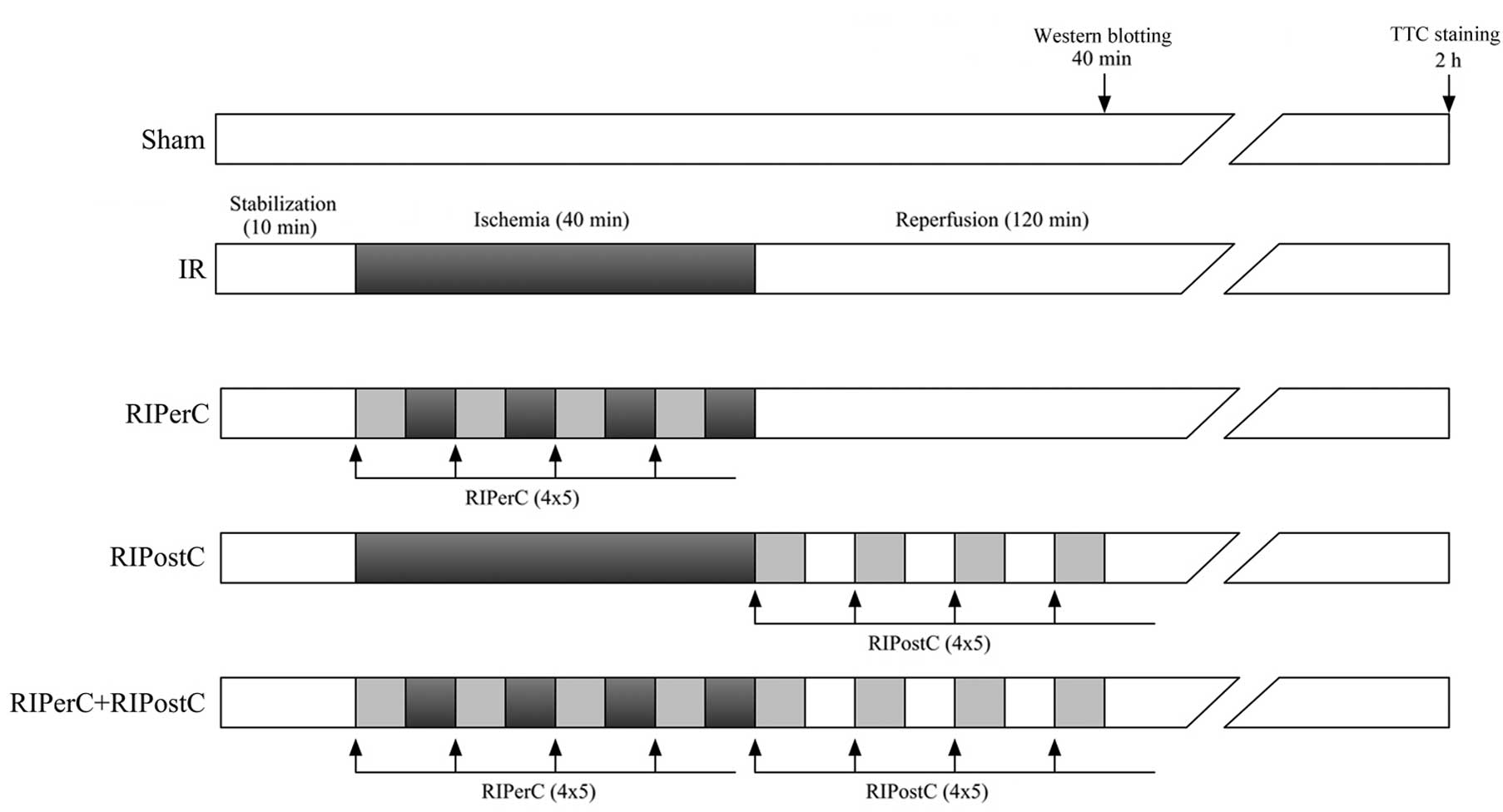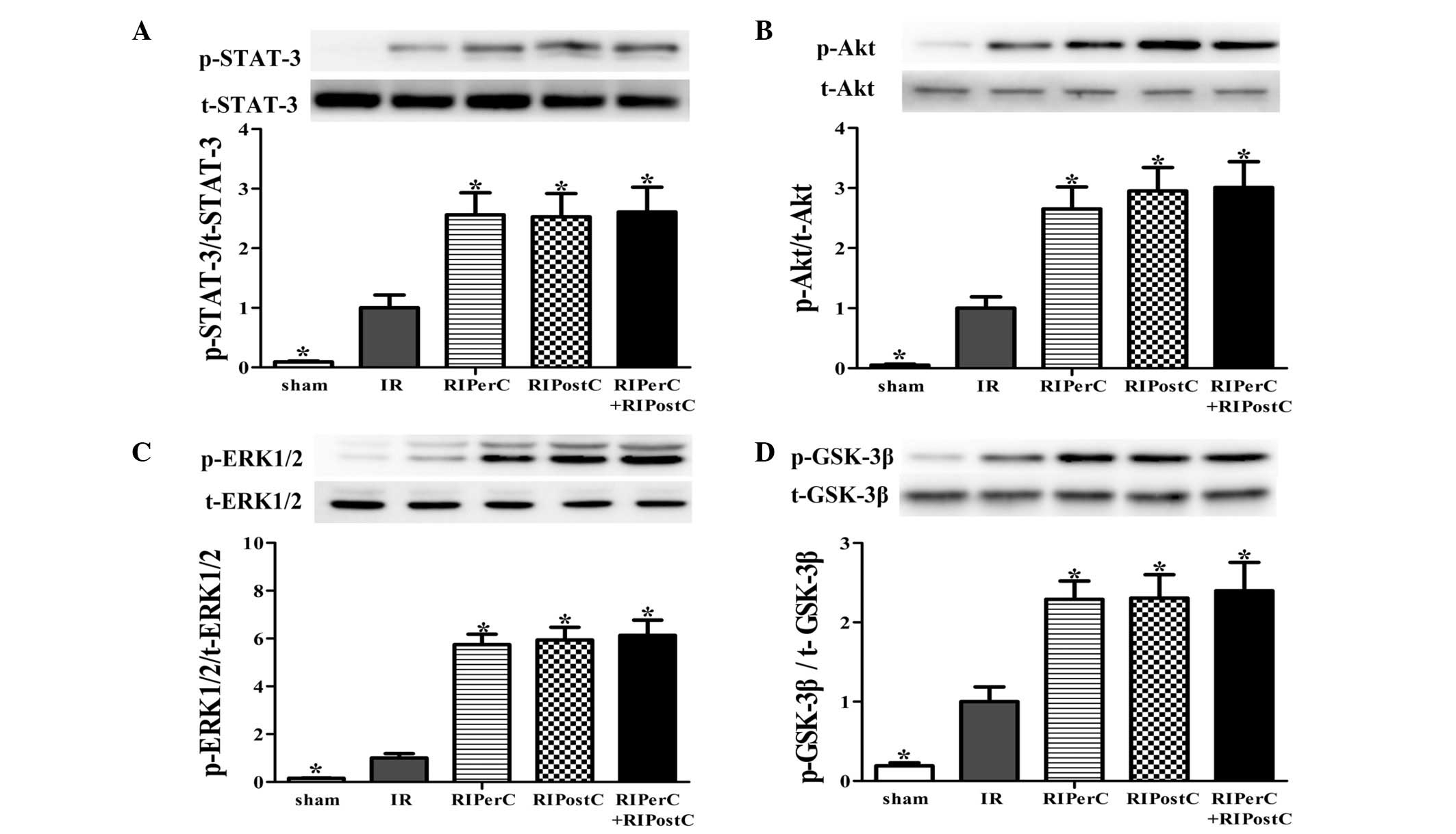|
1
|
Moens AL, Claeys MJ, Timmermans JP and
Vrints CJ: Myocardial ischemia/reperfusion injury, a clinical view
on a complex pathophysiological process. Int J Cardiol.
100:179–190. 2005. View Article : Google Scholar : PubMed/NCBI
|
|
2
|
Schmidt MR, Sloth AD, Johnsen J and Bøtker
HE: Remote ischemic conditioning: The cardiologist's perspective. J
Cardiovasc Med (Hagerstown). 13:667–674. 2012. View Article : Google Scholar
|
|
3
|
Przyklenk K, Bauer B, Ovize M, Kloner RA
and Whittaker P: Regional ischemic 'preconditioning' protects
remote virgin myocardium from subsequent sustained coronary
occlusion. Circulation. 87:893–899. 1993. View Article : Google Scholar : PubMed/NCBI
|
|
4
|
Gho BC, Schoemaker RG, van den Doel MA,
Duncker DJ and Verdouw PD: Myocardial protection by brief ischemia
in noncardiac tissue. Circulation. 94:2193–2200. 1996. View Article : Google Scholar : PubMed/NCBI
|
|
5
|
Lang SC, Elsässer A, Scheler C, Vetter S,
Tiefenbacher CP, Kübler W, Katus HA and Vogt AM: Myocardial
preconditioning and remote renal preconditioning-identifying a
protective factor using proteomic methods? Basic Res Cardiol.
101:149–158. 2006. View Article : Google Scholar
|
|
6
|
Kharbanda RK, Mortensen UM, White PA,
Kristiansen SB, Schmidt MR, Hoschtitzky JA, Vogel M, Sorensen K,
Redington AN and MacAllister R: Transient limb ischemia induces
remote ischemic preconditioning in vivo. Circulation.
106:2881–2883. 2002. View Article : Google Scholar : PubMed/NCBI
|
|
7
|
Candilio L, Hausenloy DJ and Yellon DM:
Remote ischemic conditioning: A clinical trial's update. J
Cardiovasc Pharmacol Ther. 16:304–312. 2011. View Article : Google Scholar : PubMed/NCBI
|
|
8
|
Skyschally A, van Caster P, Iliodromitis
EK, Schulz R, Kremastinos DT and Heusch G: Ischemic
postconditioning: Experimental models and protocol algorithms.
Basic Res Cardiol. 104:469–483. 2009. View Article : Google Scholar : PubMed/NCBI
|
|
9
|
National Research Council: Guide for the
Care and Use of Laboratory Animals. 7th edition. National Academy
Press; Washington DC: 1996
|
|
10
|
Xin P, Zhu W, Li J, Ma S, Wang L, Liu M,
Li J, Wei M and Redington AN: Combined local ischemic
postconditioning and remote perconditioning recapitulate
cardioprotective effects of local ischemic preconditioning. Am J
Physiol Heart Circ Physiol. 298:H1819–H1831. 2010. View Article : Google Scholar : PubMed/NCBI
|
|
11
|
Schmidt MR, Smerup M, Konstantinov IE,
Shimizu M, Li J, Cheung M, White PA, Kristiansen SB, Sorensen K,
Dzavik V, et al: Intermittent peripheral tissue ischemia during
coronary ischemia reduces myocardial infarction through a
KATP-dependent mechanism: First demonstration of remote ischemic
perconditioning. Am J Physiol Heart Circ Physiol. 292:H1883–H1890.
2007. View Article : Google Scholar
|
|
12
|
Andreka G, Vertesaljai M, Szantho G, Font
G, Piroth Z, Fontos G, Juhasz ED, Szekely L, Szelid Z, Turner MS,
et al: Remote ischaemic postconditioning protects the heart during
acute myocardial infarction in pigs. Heart. 93:749–752. 2007.
View Article : Google Scholar : PubMed/NCBI
|
|
13
|
Botker HE, Kharbanda R, Schmidt MR,
Bøttcher M, Kaltoft AK, Terkelsen CJ, Munk K, Andersen NH, Hansen
TM, Trautner S, et al: Remote ischaemic conditioning before
hospital admission, as a complement to angioplasty and effect on
myocardial salvage in patients with acute myocardial infarction: A
randomised trial. Lancet. 375:727–734. 2010. View Article : Google Scholar
|
|
14
|
Sloth AD, Schmidt MR, Munk K, Kharbanda
RK, Redington AN, Schmidt M, Pedersen L, Sørensen HT and Bøtker HE;
CONDI Investigators: Improved long-term clinical outcomes in
patients with ST-elevation myocardial infarction undergoing remote
ischaemic conditioning as an adjunct to primary percutaneous
coronary intervention. Eur Heart J. 35:168–175. 2014. View Article : Google Scholar
|
|
15
|
Carrasco-Chinchilla F, Muñoz-García AJ,
Domínguez-Franco A, Millán-Vázquez G, Guerrero-Molina A,
Ortiz-García C, Enguix-Armada A, Alonso-Briales JH,
Hernández-García JM, de Teresa-Galván E and Jiménez-Navarro MF:
Remote ischaemic postconditioning: Does it protect against
ischaemic damage in percutaneous coronary revascularisation?
Randomised placebo-controlled clinical trial. Heart. 99:1431–1437.
2013. View Article : Google Scholar : PubMed/NCBI
|
|
16
|
Sachdeva J, Dai W, Gerczuk PZ and Kloner
RA: Combined remote perconditioning and postconditioning failed to
attenuate infarct size and contractile dysfunction in a rat model
of coronary artery occlusion. J Cardiovasc Pharmacol Ther.
19:567–573. 2014. View Article : Google Scholar : PubMed/NCBI
|
|
17
|
Zhu SB, Liu Y, Zhu Y, Yin GL, Wang RP,
Zhang Y, Zhu J and Jiang W: Remote preconditioning, perconditioning
and post-conditioning: A comparative study of their
cardio-protective properties in rat models. Clinics (Sao Paulo).
68:263–268. 2013. View Article : Google Scholar
|
|
18
|
Breivik L, Helgeland E, Aarnes EK, Mrdalj
J and Jonassen AK: Remote postconditioning by humoral factors in
effluent from ischemic preconditioned rat hearts is mediated via
PI3K/Akt-dependent cell-survival signaling at reperfusion. Basic
Res Cardiol. 106:135–145. 2011. View Article : Google Scholar :
|
|
19
|
Tamareille S, Mateus V, Ghaboura N,
Jeanneteau J, Croué A, Henrion D, Furber A and Prunier F: RISK and
SAFE signaling pathway interactions in remote limb ischemic
perconditioning in combination with local ischemic
postconditioning. Basic Res Cardiol. 106:1329–1339. 2011.
View Article : Google Scholar : PubMed/NCBI
|
|
20
|
Li GC, Vasquez JA, Gallagher KP and
Lucchesi BR: Myocardial protection with preconditioning.
Circulation. 82:609–619. 1990. View Article : Google Scholar : PubMed/NCBI
|
|
21
|
Morris SD and Yellon DM:
Angiotensin-converting enzyme inhibitors potentiate preconditioning
through bradykinin B2 receptor activation in human heart. J Am Coll
Cardiol. 29:1599–1606. 1997. View Article : Google Scholar : PubMed/NCBI
|
|
22
|
Barbosa V, Sievers RE, Zaugg CE and Wolfe
CL: Preconditioning ischemia time determines the degree of glycogen
depletion and infarct size reduction in rat hearts. Am Heart J.
131:224–230. 1996. View Article : Google Scholar : PubMed/NCBI
|
|
23
|
Schulz R, Post H, Vahlhaus C and Heusch G:
Ischemic preconditioning in pigs: a graded phenomenon: its relation
to adenosine and bradykinin. Circulation. 98:1022–1029. 1998.
View Article : Google Scholar : PubMed/NCBI
|
|
24
|
Tsang A, Hausenloy DJ and Yellon DM:
Myocardial postcon-ditioning: reperfusion injury revisited. Am J
Physiol Heart Circ Physiol. 289:H2–H7. 2005. View Article : Google Scholar : PubMed/NCBI
|
|
25
|
Cohen MV and Downey JM: Ischemic
postconditioning: From receptor to end-effector. Antioxid Redox
Signal. 14:821–831. 2011. View Article : Google Scholar
|
|
26
|
Kin H, Zhao ZQ, Sun HY, Wang NP, Corvera
JS, Halkos ME, Kerendi F, Guyton RA and Vinten-Johansen J:
Postconditioning attenuates myocardial ischemia-reperfusion injury
by inhibiting events in the early minutes of reperfusion.
Cardiovasc Res. 62:74–85. 2004. View Article : Google Scholar : PubMed/NCBI
|
|
27
|
Cohen MV, Yang XM and Downey JM: The pH
hypothesis of postconditioning: staccato reperfusion reintroduces
oxygen and perpetuates myocardial acidosis. Circulation.
115:1895–1903. 2007. View Article : Google Scholar : PubMed/NCBI
|
|
28
|
Yang XM, Proctor JB, Cui L, Krieg T,
Downey JM and Cohen MV: Multiple, brief coronary occlusions during
early reperfusion protect rabbit hearts by targeting cell signaling
pathways. J Am Coll Cardiol. 44:1103–1110. 2004. View Article : Google Scholar : PubMed/NCBI
|
|
29
|
Cheung MM, Kharbanda RK, Konstantinov IE,
Shimizu M, Frndova H, Li J, Holtby HM, Cox PN, Smallhorn JF, Van
Arsdell GS and Redington AN: Randomized controlled trial of the
effects of remote ischemic preconditioning on children undergoing
cardiac surgery: first clinical application in humans. J Am Coll
Cardiol. 47:2277–2282. 2006. View Article : Google Scholar : PubMed/NCBI
|
|
30
|
Shimizu M, Saxena P, Konstantinov IE,
Cherepanov V, Cheung MM, Wearden P, Zhangdong H, Schmidt M, Downey
GP and Redington AN: Remote ischemic preconditioning decreases
adhesion and selectively modifies functional responses of human
neutrophils. J Surg Res. 158:155–161. 2010. View Article : Google Scholar
|
|
31
|
Albrecht M, Zitta K, Bein B, Wennemuth G,
Broch O, Renner J, Schuett T, Lauer F, Maahs D, Hummitzsch L, et
al: Remote ischemic preconditioning regulates HIF-1α levels,
apoptosis and inflammation in heart tissue of cardiosurgical
patients: A pilot experimental study. Basic Res Cardiol.
108:3142013. View Article : Google Scholar
|
|
32
|
Wang NP, Pang XF, Zhang LH, Tootle S,
Harmouche S and Zhao ZQ: Attenuation of inflammatory response and
reduction in infarct size by postconditioning are associated with
down-regulation of early growth response 1 during reperfusion in
rat heart. Shock. 41:346–354. 2014. View Article : Google Scholar
|


















